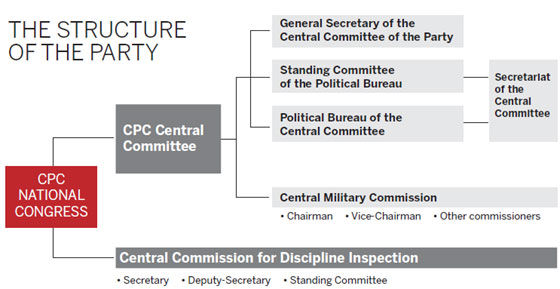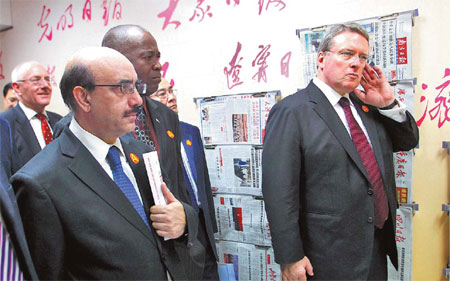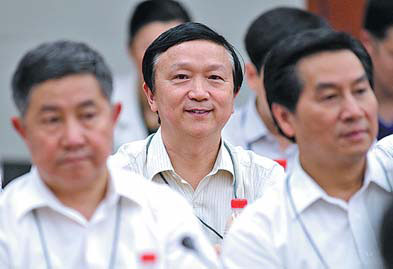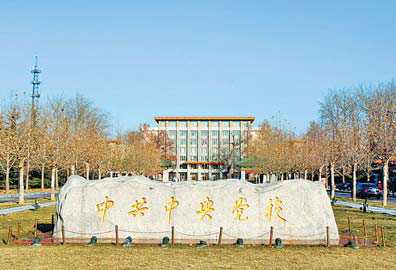Institutions open the door to scrutiny
Updated: 2012-11-09 08:03
By An Baijie (China Daily)
|
||||||||
|
Masood Khan (left), Pakistan's ambassador to China, and other diplomats visit the Publicity Department of the CPC's Central Committee in Beijing. Zou Hong / China Daily |
|
Officials at a seminar during German Chancellor Angela Merkel's visit to the Party School in 2010. Xu Jingxing / China Daily |
|
The entrance of the Party School of the CPC's Central Committee in northwest Beijing. Provided to China Daily |

Many of China's major Party organizations are engaged in an ongoing project to promote greater openness and transparency, and provide better services. An Baijie reports from Beijing.
Located in an aptly nondescript hutong, or alley, in the Xicheng district of Beijing, China's Central Archives had long been a no-go area for ordinary citizens, discouraged by the presence of guards from the People's Liberation Army.
However, the organization, which is overseen by the Central Committee of the Communist Party of China has become less mysterious in recent years. The transformation began in earnest in May 2011 when more than 70 journalists from China and overseas were invited to visit the building and view some of the previously unseen material it houses.
The visit was part of an ongoing project to lift the veil of secrecy that has hung over many State organizations for decades, and make the Party's central agencies more transparent to the public.
Yang Dongquan, director of both the State Archives Administration and the Central Archives, said that the event had "opened a historic door".
The journalists were allowed to view some of the archives' most precious materials, including a handwritten composition by Chairman Mao Zedong, when he was a 19-year-old high school student in Shaoshan, his hometown in Hunan province.
In the piece, Mao gave his opinion on Shang Yang, a senior official during the Warring States Period (475-221 BC) whose reforms laid the basis of his kingdom's thriving economy and helped the emperor's offspring to unify China and establish the Qin Dynasty (221-206 BC).
The journalists also watched videotapes of speeches delivered by Mao, former premier Zhou Enlai, and the architect of the reform and opening-up policy Deng Xiaoping.
Yin Li, director of the archives' publicity department, said the number of overseas visitors doubled in the 2007- 2011 period compared with 1997 to 2006.
"Foreign individuals and organizations can apply for access to the material, all they have to do is present their passports," she said.
"Last year, an Italian researcher from the University of Venice applied to read material concerning the Sino-Italian relationship during the Cold War. We were able to offer her 52 documents relating to economics, culture and politics," she added.
Open to the public
In 2008, the archives established an information center covering more than 600 square meters. The facility is equipped with computers on which visitors can search for documents and other material.
Roughly 2,260 people from China and abroad visited the archives between May 2008 and June this year, viewing more than 4,600 documents, according to Yin.
"Serving the people is our most important function," said Yang. "At the same time, we must ensure the safety of all the documents and protect confidential material."
Around 40 percent of the material in the archives is now easily accessible, including more than 100 million paper documents, 160,000 photos, 16,000 audio and visual records and other assorted items.
In common with official archives in other countries, the authorities have imposed a 30-year lock on access to extremely sensitive documents, ensuring that the events described will be historical fact rather than current issues and that many of the participants will have passed away by the time the files are opened, said Yang.
However, some documents currently classified as confidential, especially those relating to defense, diplomacy and public security, will become available over time, when such a move is deemed appropriate, he said.
The authorities at the archives have signed bilateral agreements with 14 countries, and the agency has also participated in a number of joint exhibitions with countries such as Russia, Vietnam and Singapore. Meanwhile, staff from the state archives in Pakistan and the Democratic People's Republic of Korea are also trained in Beijing, he said.
Unlocking the door
The move toward greater openness is also being encouraged in other Party agencies. The CPC Central Commission for Discipline Inspection and the Party School of the Central Committee of the CPC have started to open their doors to foreign journalists and diplomats during the past two years.
The CPC's Central Commission for Discipline Inspection, the Party's main anti-corruption agency, received visits from 45 foreign diplomats in April 2011. The visits were aimed at providing the diplomats with a better understanding of China's anti-graft measures and also to promote cooperation in an international crackdown on corruption, according to Wu Yuliang, deputy secretary of the commission, in an interview with People's Daily in April last year.
More than 30 journalists, including 20 from countries such as the United States, Japan and Egypt, visited anti-graft agencies in six counties and cities in the eastern provinces of Jiangsu and Zhejiang in September 2011 to hear local officials explain their approach and experiences in coordinating anti-graft measures.
Lin Yi, the commission's deputy secretary in Wuxi, Jiangsu, said that greater transparency and approachability will help to dispel misunderstandings between China and other countries.
"We should let people overseas know that the Party is strengthening its anti-graft measures and that our anti-corruption projects are becoming more and more transparent," he said.
Meanwhile, the Party School of the CPC's Central Committee, located in northwest Beijing, took the unprecedented step of opening its doors to domestic and international media in June 2010, on the day before the 89th anniversary of the Party's foundation.
More than 60 reporters, including 42 from 24 foreign news agencies, attended the tour of the previously secretive establishment, which provides training for middle and high-ranking officials, including ministers, provincial chiefs and governors.
The reporters visited classrooms, the gym, dormitories, the cafeteria, and the guest hall, before attending a class, where training was being provided for young and middle-aged officials with the potential to hold provincial-level posts.
Chen Baosheng, vice-president of the Party School, admitted that the institution had not been particularly welcoming to foreign media in the past, but he said it planned to be more open in the years to come. "The CPC has nothing to hide, and we will communicate with anyone who wants to talk with us," he said.
The opening of the door to foreign journalists is a sign of the Party's growing confidence and maturity, according to Yin Yungong, director of the journalism and communication research institute of the Chinese Academy of Social Sciences. "It shows that the CPC is adopting an open stance as a ruling party," he said.
More cooperation
Guo Siping, spokeswoman for the Central Archives, said that she hopes to cooperate more with news media to provide the public with a more relevant and timely service.
The remarks were made in June 2010, when Guo and 10 others from various Central Committee departments were introduced to the public at a news conference. During the 70-minute event, which was broadcast live on China Central Television, all 11 - nine men and two women - pledged to improve access for media organizations and to boost transparency.
Not all of those in the spotlight managed to perform naturally at the conference, a legacy of years of behind-the-scenes activity, and one spokesman's hand trembled noticeably as he held the microphone and introduced himself to the reporters.
Wang Chen, director of the International Communication Office of the CPC Central Committee and also the minister of the State Council's Information Office, said publicizing and explaining Party information has become a major focus in recent years.
"(The system) is key to making Party affairs public by promoting intra-Party democracy, improving the Party's ability to govern and cultivating a favorable environment for the development of the CPC and China," said Wang.
The central committee first explicitly proposed setting up the system, and the move was ratified and endorsed at the Fourth Plenary Session of the 17th CPC Central Committee in September 2009.
The mechanism was established in central and provincial Party committees by the end of 2010, with all the relevant names and telephone numbers made publicly available.
The spokespersons are required to respond quickly to emergency cases and to play a leading role in informing the public about government policy.
More than 200 Party spokespersons underwent three days of training in Beijing in February 2011, during which they learned the skills required to answer journalists' questions, hold news conferences and to communicate with overseas media.
One of the people who helped train the liaison offices, Liu Xiaoying, a professor of news media research at the Communication University of China, said the trainees were required to play the roles of journalists and spokespersons in the training courses.
"By playing these different roles, they will better understand how reporters think," he said.
The mechanism has provided a platform for the public and helps guarantee their right to know, to participate, to express and to supervise, he said.
"Only when people's rights are protected, can the Party get timely feedback on its policies," he said.
Contact the reporter at anbaijie@chinadaily.com.cn

(China Daily 11/09/2012 page7)

 Relief reaches isolated village
Relief reaches isolated village
 Rainfall poses new threats to quake-hit region
Rainfall poses new threats to quake-hit region
 Funerals begin for Boston bombing victims
Funerals begin for Boston bombing victims
 Quake takeaway from China's Air Force
Quake takeaway from China's Air Force
 Obama celebrates young inventors at science fair
Obama celebrates young inventors at science fair
 Earth Day marked around the world
Earth Day marked around the world
 Volunteer team helping students find sense of normalcy
Volunteer team helping students find sense of normalcy
 Ethnic groups quick to join rescue efforts
Ethnic groups quick to join rescue efforts
Most Viewed
Editor's Picks

|

|

|

|

|

|
Today's Top News
Health new priority for quake zone
Xi meets US top military officer
Japan's boats driven out of Diaoyu
China mulls online shopping legislation
Bird flu death toll rises to 22
Putin appoints new ambassador to China
Japanese ships blocked from Diaoyu Islands
Inspired by Guan, more Chinese pick up golf
US Weekly

|

|









